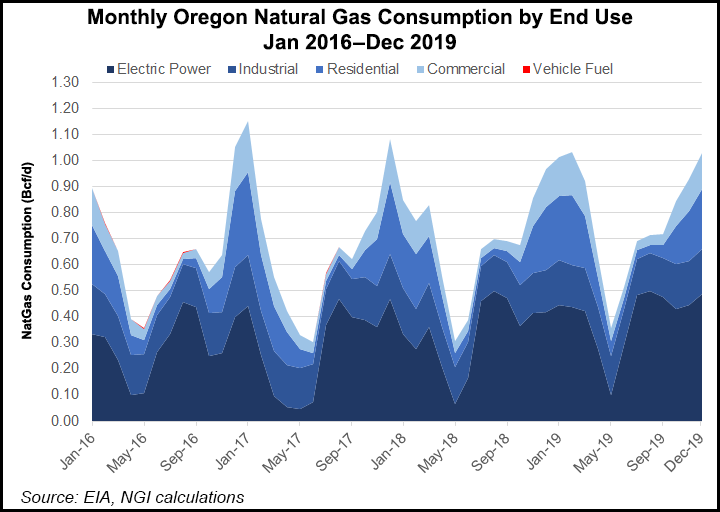Regulatory | Infrastructure | NGI All News Access
Oregon Governor Orders Accelerated Carbon Reduction Actions
Oregon Gov. Kate Brown on Tuesday issued an executive order (EO) aimed at accelerating the state’s efforts to decarbonize the natural gas, transportation and industrial sectors.

Brown’s action updates Oregon’s carbon emission reduction goals, hitting at greenhouse gas (GHG) emissions. “Immediate and comprehensive efforts are needed to tackle this scourge” devastating the state, she said.
The legislature’s Republican minority avoided voting on the Democratic super majority’s House Bill 2020 last year. The bill had been approved by the state House and called for Oregon to adopt an emission cap-and-trade program and establish a Carbon Policy Office to adopt “climate action programs.” The bill also would have abolished state carbon standards.
The 15-page EO resets carbon emission goals to reach 45% reduction from 1990 levels by 2035 and 80% by 2050, while setting sector-specific caps for carbon on transportation, natural gas and heavy industry. It also doubles the state’s clean fuels program for cars and trucks to 20% and 25% by 2030 and 2035, respectively.
“This is the most ambitious goal for clean fuels in the country, and it will substantially reduce carbon emissions in transportation, using a model proven to reduce pollution at a very minimal cost,” Brown said.
Higher energy efficiency for buildings and appliances is called for in the EO, along with greater emphasis on electrification and encouraging the use of electric vehicles.
Brown said she was taking the boldest action possible under existing state laws and vowed to “pursue every option available under existing law to combat the effects of climate change.” She specified the “transition from fossil fuels to cleaner energy resources,” and said she expects the action to “significantly reduce emissions and increase energy security.”
The state’s transportation department and Oregon Public Utility Commission (PUC) is to lead the transition to alternative-fueled vehicles and utilities with smaller carbon footprints. The PUC was directed to implement recommendations from the Governor’s Council on Wildfire Response.
Portland, OR-based NW Natural spokesperson Melissa Moore said the gas-only utility was “digesting the details” and trying to determine how the measure could impact customers.
Portland General Electric agreed with Brown’s “sense of urgency,” noting the importance of reducing GHG emissions on an economy-wide basis. While PGE is still reviewing the EO, spokesperson Elizabeth Lattanner said the utility already is pursuing a “clean energy future.”
“The cap-and-trade and invest bills introduced during the last two legislative sessions provided [an economy-wide] framework, and we still encourage constructive action from a future legislature that meets the same standards,” Lattanner said.
© 2024 Natural Gas Intelligence. All rights reserved.
ISSN © 1532-1231 | ISSN © 2577-9877 |
